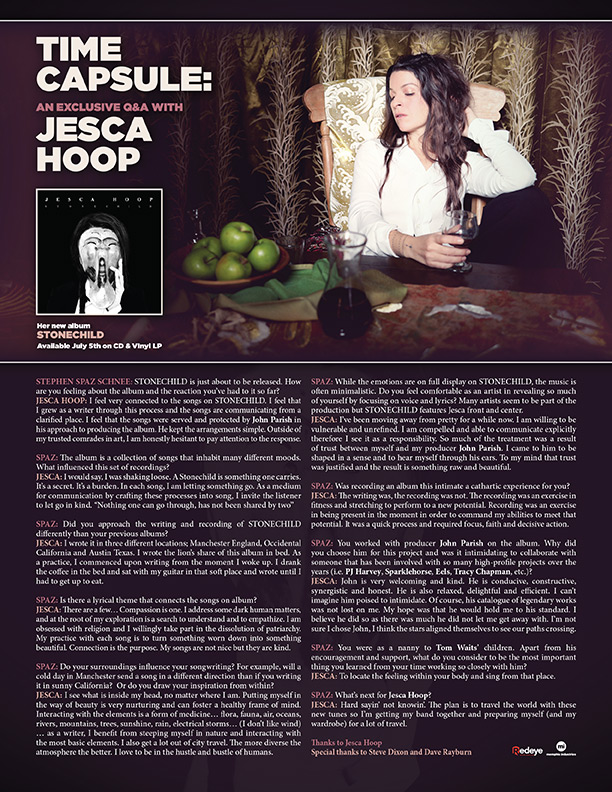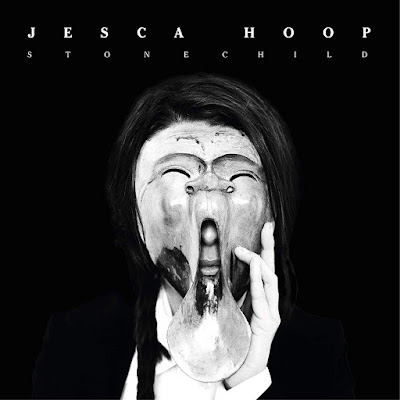TIME
CAPSULE:
STEPHEN SPAZ SCHNEE: STONECHILD
is just about to be released. How are you feeling about the album and the
reaction you’ve had to it so far?
JESCA HOOP: I feel very connected to the songs on
STONECHILD. I feel that I grew as a writer through this process and the
songs are communicating from a clarified place. I feel that the songs were
served and protected by John Parish
in his approach to producing the album. He kept the arrangements simple.
Outside of my trusted comrades in art, I am honestly hesitant to pay attention
to the response.
SPAZ: The album is a collection of songs that inhabit many
different moods. What influenced this set of recordings?
JESCA: I would say, I was shaking loose. A Stonechild is something
one carries. It’s a secret. It’s a burden. In each song, I am letting something
go. As a medium for communication by crafting these processes into song, I
invite the listener to let go in kind. “Nothing one can go through, has not
been shared by two”
SPAZ: Did you approach the writing and recording of STONECHILD differently than your previous albums?
JESCA: I wrote it in three
different locations; Manchester England, Occidental California and Austin
Texas. I wrote the lion’s share of this album in bed. As a practice, I
commenced upon writing from the moment I woke up. I drank the coffee in the bed
and sat with my guitar in that soft place and wrote until I had to get up to
eat.
SPAZ: Is there a lyrical theme that connects the songs on album?
JESCA: There are a few… Compassion is one. I address some dark
human matters, and at the root of my exploration is a search to understand and
to empathize. I am obsessed with religion and I willingly take part in the
dissolution of patriarchy. My practice with each song is to turn something worn
down into something beautiful. Connection is the purpose. My songs are not nice
but they are kind.
SPAZ: Do your surroundings influence your songwriting? For example,
will a cold day in Manchester send a song in a different direction than if you
writing it in sunny California? Or do
you draw your inspiration from within?
JESCA: I see what is inside my head, no matter where I am. Putting
myself in the way of beauty is very nurturing and can foster a healthy frame of
mind. Interacting with the elements is a form of medicine… flora, fauna, air,
oceans, rivers, mountains, trees, sunshine, rain, electrical storms… (I don’t
like wind) … as a writer, I benefit from steeping myself in nature and
interacting with the most basic elements. I also get a lot out of city travel.
The more diverse the atmosphere the better. I love to be in the hustle and
bustle of humans.
SPAZ: While the emotions are on full display on STONECHILD,
the music is often minimalistic. Do you feel comfortable as an artist in
revealing so much of yourself by focusing on voice and lyrics? Many artists
seem to be part of the production but STONECHILD features Jesca front and
center.
JESCA: I’ve been moving away
from pretty for a while now. I am willing to be vulnerable an unrefined. I am
compelled and able to communicate explicitly therefore I see it as a
responsibility. So much of the treatment
was a result of trust between myself and my producer John Parish. I came to him
to be shaped in a sense and to hear myself through his ears. To my mind that
trust was justified and the result is something raw and beautiful.
SPAZ: Was recording an album this intimate a cathartic experience
for you?
JESCA: The writing was, the
recording was not. The recording was an exercise in fitness and stretching to
perform to a new potential. Recording was an exercise in being present in the
moment in order to command my abilities to meet that potential. It was a quick
process and required focus, faith and decisive action.
SPAZ: You worked with producer John Parish on the album. Why did
you choose him for this project and was it intimidating to collaborate with
someone that has been involved with so many high-profile projects over the
years (i.e. PJ Harvey, Sparklehorse,
Eels, Tracy Chapman, etc.)?
JESCA: John is very
welcoming and kind. He is conducive, constructive, synergistic and honest. He
is also relaxed, delightful and efficient.
I can’t imagine him poised to intimidate. Of course, his catalogue of
legendary works was not lost on me. My hope was that he would hold me to his
standard. I believe he did so as there was much he did not let me get away
with. I’m not sure I chose John, I think the stars aligned themselves to see
our paths crossing.
SPAZ: You were as a nanny to Tom
Waits’ children. Apart from his encouragement and support, what do you
consider to be the most important thing you learned from your time working so
closely with him?
JESCA: To locate the feeling within your body and sing from that
place.
SPAZ: What’s next for Jesca Hoop?
JESCA: Hard sayin’ not
knowin’. The plan is to travel the world with these new tunes so I’m getting my
band together and preparing myself (and my wardrobe) for a lot of travel.
Thanks to Jesca Hoop
Special thanks to Steve Dixon and Dave
Rayburn
JESCA HOOP
STONECHILD
(Memphis Industries)
7.5.19

